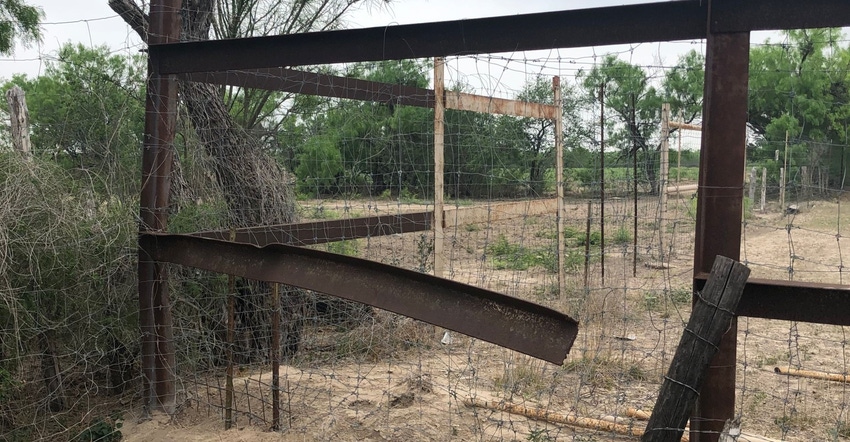Legislation reimburses farmers for border damages
RAPID Act repurposes unspent COVID funds to create a reimbursement program for ag producers who incur losses caused by illegal border crossings.

In June, U.S. Border Patrol encountered 188,829 migrants who entered the country illegally at the southern border, the highest figure in twenty years. Rep. Tony Gonzales, R-Texas, says he hears from farmers and ranchers daily who experience damage on their property from the migrants trespassing across their land.
Gonzales joined with Rep. August Pfluger, R-Texas, in introducing the bipartisan Reimbursing Agriculture Producers for Immigration Damages -RAPID - Act with Rep. Vicente Gonzalez, D-Texas, and Henry Cuellar, D-Texas, to create a reimbursement program for agricultural producers that incur losses caused by illegal border crossings.
The bill repurposes monies from the American Rescue Plan to reimburse America’s agricultural producers for damages stemming from illegal immigration, including livestock loss, crop loss and damage, damage to perimeter fences, damage to physical structures and property loss/damage.
“In many cases, our farmers – who are already struggling due to the pandemic and severe Texas weather earlier this year – are having to pay for these repairs out of their own pockets,” Gonzales says. "Texans should not be responsible for the losses at the hands of the Biden border crisis and are entitled to reimbursement for the damages they have sustained.”
Related: Border situation threatens farmers’ livelihood
“Texas ranchers are facing significant hardships amid a flood of illegal border crossings and must continually fix cut fences and damaged infrastructure,” says Hughes Abell, president of the Texas & Southwestern Cattle Raisers Association. “We commend the bipartisan legislation filed today to help these hardworking men and women recoup some of the costs they bear and urge Congress to quickly pass this much-needed assistance."
Cuellar notes the cost of illegal immigration is growing. “Farmers and ranchers are confronting damages to their crops and residences by illegal immigrants trespassing to avoid law enforcement. Locally, Texas’ farms and ranches cover over 125 million acres of land. These farms and ranches have been critical to keeping food in our grocery stores during the pandemic,” says Cuellar. “The RAPID Act will support our farmers and ranchers by providing reimbursements for qualified damages due to illegal immigration - such as livestock loss and crop and property damage.”
Cuellar explains this bill will establish the Emergency Land and Food Program to implement these reimbursements, while prioritizing agriculture producers located in counties with high levels of immigration along the southern border.
Texas Farm Bureau supports the RAPID Act in an effort to provide short-term financial assistance to the farm and ranch families who are shouldering the burden of the border crisis. TFB President Russell Boening says TFB is listening to the concerns of many farmers and ranchers who have experienced significant property damages due to the influx of illegal immigration.
“Texas farmers and ranchers must continually repair cut fences and damaged infrastructure, as well as face threats to their life while on their private property,” Boening says.
He says the legislation offers a commonsense and tailored solution to these unprecedented issues by reimbursing hardworking farm and ranch families for qualified damages. “While a long-term fix to our nation’s border crisis is desperately needed, this assistance will help struggling producers in the meantime. TFB looks forward to working with these leaders and others in Congress to pass this legislation.”
“As stewards of large sections of the Southern Border, ranchers suffer a disproportionate share of the burden associated with illegal border crossings,” says National Cattlemen’s Beef Association Vice President of Government Affairs Ethan Lane. “Not only do illegal border crossings damage property and livestock, but they also endanger ranchers and their families.”
TFB spearheaded a national Farm Bureau effort in June urging top Biden administration officials to recognize the border crisis and take swift action to help farm and ranch families impacted by the surge of illegal immigration.
Farmers and ranchers along the border continue to share stories of financial hardship and disruption that have occurred as a result. View their stories on TFB’s Border Crisis Impacts webpage.
About the Author(s)
You May Also Like



.png?width=300&auto=webp&quality=80&disable=upscale)

